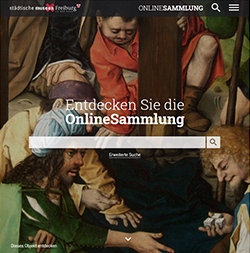Insights into the History of the Collection
Dr. h.c. Hugo Ficke
17.9.1840 – 15.12.1912
Hugo Ficke was born on 17 September 1840 in Hamburg. He moved to Freiburg in 1853 with his family. Financially independent, he was able to dedicate himself to numerous honorary positions and expeditions. He joined the Freiburg Masonic Lodge Zur edlen Aussicht (The Belvedere) and remained a member for almost fifty years. He was grandmaster at the Bayreuth grand lodge Zur Sonne (The Sun) from 1902 until 1908 and subsequently honorary grandmaster. All in all, he was an honorary member of no fewer than forty lodges
Committed to local politics, Ficke was also a member of the Freiburg City Council for thirty years and also held a seat from 1875 until 1881 and from 1887 until 1911. However, he turned down the offer of a mandate for the Reichstag. Ficke was also president of the Harmoniegesellschaft Freiburg and active in several local commissions. In 1883 he became a member of the Naturforschenden Gesellschaft Freiburg (Nature Research Society) and the Kolonialverein (Colonial Socirty). Hugo Ficke died in 1912 during a trip to Asia.
Hugo Ficke and the Museum
Dr. Ficke was an important supporter of the fledgling Museum für Natur- und Völkerkunde. As a member and head of the Commission für die Gründung eines Städtischen Museums für Natur- und Völkerkunde (Commission for the Foundation of a Municipal Museum of Natural History and Ethnology), he defended the interests of the museum. After Adolf Fritze resigned in 1896, he assumed the role of honorary director of the museum. He was also on the board of the Commission for the Vereinigten Sammlungen der Stadt Freiburg (United Collections of the City of Freiburg,) founded in 1899. In 1912, he wrote the essay "Anhaltpunkte für die Sammlung von ethnographischen Gegenständen" (Points of Reference for the Collection of Ethnographic Objects), which provides practical information on the job of collecting and acquisitions. Ficke warns in his essay that the prices for objects are usually too high and that to haggle over the price is desirable. In addition, the museum should have as broad a collection as possible.
During his lifetime, his commitment was honoured with an honorary doctorate from the University of Freiburg. After his death, he was also honoured with a marble bust that was placed in the museum in 1915.
Ficke's Travels
During his first major expedition in 1900, Ficke visited Egypt, Palestine, Syria and Greece. Further trips to Sweden, Norway, Belgium, England and Russia followed. In 1908, he embarked on a year-long journey around the world, revisiting Egypt and then onward to India, Japan, China and Korea. He describes his experiences in his book Meine Orientreise in den Jahren 1908 und 1909 (My Journey to the Orient in 1908 and 1909), in which he describes the various stages of his journey, the people and his acquisitions for the museum.
He embarked on another journey to Asia in autumn of 1912. Accompanied by his wife, he visited Ceylon (present-day Sri Lanka) and India, as well as Burma (present-day Myanmar). However, Ficke died of pneumonia on 15 December in Rangoon during the trip. As the repatriation of his body was delayed, he was initially buried in situ. Cremation of his body and subsequent transfer of the urn to Germany could only take place six months later. Hugo Ficke was buried finally laid to rest on 9 February 1914 in Freiburg.
Ficke Donation
On his travels, Ficke collected extensive ethnological and natural history collections for the museum. He returned with no fewer than1,373 ethnographical objects from his travels around the world in 1908/1909. This ethnological collection contained objects from all spheres of life of local communities, such as household objects, objects for secular and religious festivities, musical instruments and furniture.
Ficke was also interested in regional and national natural history. His first donations to the museum included a collection of large butterflies from Baden. Until 1913, he also made donations to the museum comprising various marine invertebrates and fish from the Mediterranean, two bird skins from Mexico, a piece of magnetic iron ore from Lapland and collections of small butterflies, dragonflies and coral sticks.
Ficke also supported the museum financially and generously donated the princely sum of 10,000 Marks for the new museum building. He was thanked for his commitment by being named twice on the roll of honour (1898 and 1900).







